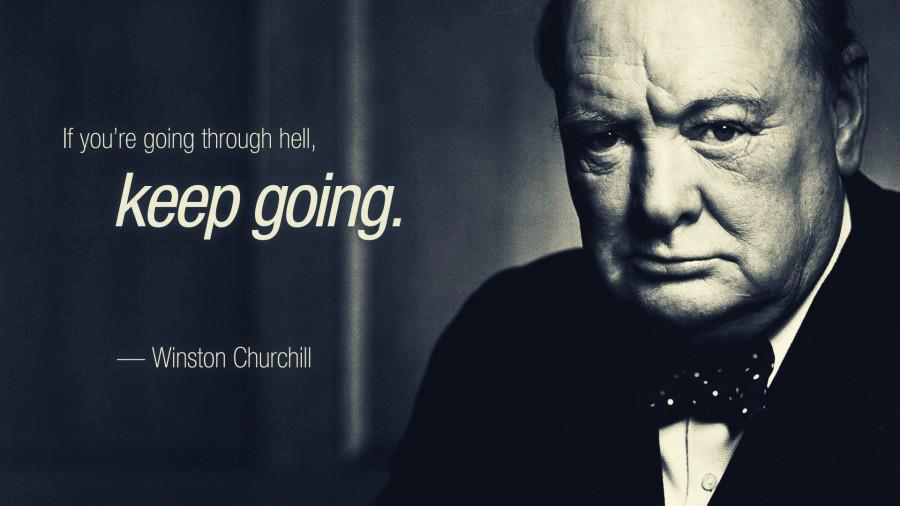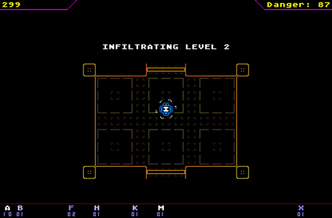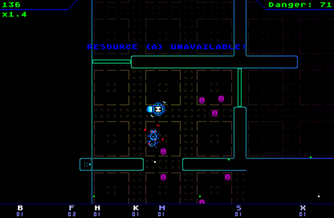|
Those who know me are aware that BeMuse has been slowly driving me mad over the last few months - if not longer. I'm not happy with the way the gameplay clashes with the visuals. I'm not comfortable with the non-tactile movement. I'm concerned that I've ended up with a one-shot 'experiential' game despite stating that I'd never do that again after Incoboto. Every day, booting up Unity takes a little more out of me, and each evening leaves me feeling like I've heard the gears of the infernal realm grind away my resolve. To overstretch the metaphor, it's been hell-ish*. *Note: 'ish' because real hell probably doesn't involve being an indie game dev with sufficient food, a house in the Bay Area, and people who care about him. There's a Winson Churchill quote I'd like to use here: I've seen this quote used by people working on long, difficult projects. I've seen it used by indie developers. When times are tough, money is tight, or a set of mechanics aren't working out, it rises up once more to provide an inspirational push. "Just a bit further and you'll reach it!" "Come on, all that stands between you and success is hard work!" "It's tough, but it'll be worth it!" But there's a problem. While its 'man up' message is useful where one merely needs to grind toward a (hopefully inevitable and positive) conclusion it's a terrible mantra for doubt-ridden, uncertain creative work. Yet I'm guessing even now that some young indie has this as their backdrop, reminding them that if things aren't working out, they should merely keep digging that hole they are in a little deeper in order to strike gold. Hell and 1% Inspiration As the 'hole' comment above illustrates, there are other variants,such as: "Genius is 1% inspiration and 99% perspiration" This, too, suggests that sheer hard work and determination will pay off. You're supposed to read: "Even geniuses need to work hard for their ideas to come to fruition, so you work hard, too, and you're 99% there." Apparently, difficulties merely need sufficient grinding of teeth in order to turn into success - or at least to make way for another 'Genius 1%' moment to pop in. In truth, the 'Genius 1%' may pop in and out throughout a project. Sometimes a new 1% pops in and points out that part of the other 99% of work you were doing was really stupid and pointless. Sometimes a 1% will pop in and lie about how cool and successful it is, eventually revealing itself to be just an additional '99% of perspiration' in disguise. The problem is that they all look the same, so it's often hard to be sure which is which, and when the time for hard work alone has come. The AAA Mindset So how does AAA cope with the variability of the 1% Genius element? It doesn't. It does its very best to eliminate the vagaries of the 1% and pushes that 99% to a full, hearty, knowable 100% of perspiration (Keep Going!). A modern AAA studio's continued existence relies on getting rid of that tricksy percentile. This is understandable, because for them, the fail-state is unthinkable; publisher cancellation and, after some fraught months, a purge of the entire team. I've worked at AAA companies for decades and this kind of thinking rubs off on you even if you don't realise it. Like many, I've been trained to believe that every project is a marathon... run at the speed of a sprint, or at least a wild, sweaty jog. "Working damned long and hard is the only way to make something successful. Failure isn't an option." My previous game, Incoboto, was built with this philosophy. It was successful, reviewed very well, and was largely a work fashioned by grinding my way through an enormous workload, entirely by myself, in isolation, over a 22 month period. I was incredibly pleased with the results, but it reinforced the wrong-headed lessons I outlined above. Embracing the Indie Mindset (finally) 'Real' indies don't think this way. Indies often haven't learned the big, adult lesson about grind and grit. They mostly expect to fail in one way or another. And when they do, they shrug it off and move on. Even those agonising over a game for years are usually fairly sure their game works in principle even if it isn't perfect. They've already thrown away more good ideas than I've had published games and that's okay. As an indie developer, what should I have learned instead of my big AAA lessons? Well, here are 3 off the top of my head:
So, having admitted that I've learned some bad lessons, and finally realised what the correct lesson are, how am I planning to change things? Well, this comes in two parts. Spellrazor A couple of weeks ago, my wife was required to attend a work event in Mexico. It was horribly hot and humid, so - as a massive introvert - I decided to hide out in the air-conditioned hotel room for the 4 days we were there. During that time, I worked on a weird old game I've considered reviving for many years. It's called 'Spellrazor'* *yes, it's a deliberately cheesy title - as befits a child of the 1980s The cabinet blurb would be: "Spellrazor marries the procedural generation and permadeath of rogue with the visuals, tactile feel and action of games like Robotron, Defender and Berzerk." "It's a roguelike shooter with 26 weapon buttons. Each key on the keyboard represents a spell. You kill things, you collect spells (in the form of letters) and you can use these at any time by pressing the appropriate key." When I was about 12, I saw Defender and fell in love. In its brightly pixelled worlds I discerned a future filled with delight and wonder. I have a particular love of games from this period (1980-1983). They were frequently cold, cruel and utterly uncompromising. Spellrazor is a game from the same school of philosophy. I released versions online last week, and friends of mine are already playing it. Early signs are really good. Unlike BeMuse, there's no requirement of secrecy or of confused players trying to figure out 'what the hell kind of game is this?'
For those patient enough to have waded their way through this little post, you can follow Spellrazor (and play early builds) on Tigsource here: http://forums.tigsource.com/index.php?topic=50678.msg1184968#msg1184968 BeMuse For now, BeMuse is going on a shelf. I don't think it's permanent. I hope to return to it at some point in the future, with the verve, joy and speed of progress I'm experiencing with Spellrazor. In the meantime, if anyone is interested in playing the weird text-heavy skeleton (not the graphical game) of BeMuse, please contact me and I'll be more than happy to share. Thanks for your time, and for your interest.
8 Comments
I am very interested in playing the weird text-heavy skeleton of Bemuse. I would dearly love to play the 'graphical' game if you would like some feedback - I am a new games developer with 39 years of playing all sorts of games under my belt for what it is worth (Graphic Designer by trade).. I understand about Bemuse, though was and have been looking forward to BeMuse since the first post - there is a desperate and sincere lack of 'good' iOS games available, in my opinion and this felt fresh like Inco.
Reply
Dene
10/6/2015 09:23:45 am
Thanks for the kind words. The last couple of years have been very taxing. Spellrazor is my way of getting something fun out quickly.
Reply
Zav
10/9/2015 03:50:53 pm
Thanks for these Dene.. I have downloaded both and will give both some time over the coming days..
Reply
Dene
10/9/2015 03:58:31 pm
TigSource now holds the new build from today. Far superior. :-)
Dene
10/9/2015 05:18:27 pm
For those of you who don't want to scroll to the top: http://forums.tigsource.com/index.php?topic=50678.msg1184968#msg1184968
Uggbo
10/21/2015 07:50:47 pm
So... It's as it is then. Sigh.
Reply
Leave a Reply. |
AuthorFluttermind’s director, Dene Carter, is a games industry veteran of over 25 years, and co-founder of Big Blue Box Studios, creators of the Fable franchise for the XBox and XBox 360. Archives
April 2022
Categories |




